Soviet partisans in the forests of Verdun
In the Central Museum of the Armed Forces is stored the silk banner of the Soviet partisan detachment "Stalingrad", which in 1944, selflessly fought against the Nazis in the east of France. This banner was presented to Soviet partisans by French and Spanish women-patriots who participated in the resistance movement in France during the Second World War.
2 February 1944, the squad "Stalingrad" received its first baptism of fire under the French Verdun. Then he represented himself from a small group of Soviet soldiers who had managed to flee, like their commander, Ponomarev, George Polikarpovich, from the fascist camps. These were N. Kozhin, V. Kuznetsov, A. Kuzmin, A. Ovchinnikov, M. Malyshev, M. Sosnin, D. Ogorodnikov, and also 17-year-old Fyodor Aksinin, who was hijacked by the Nazis to France from Ukraine, and an Armenian " Oleg ”(Hayk Ter-Tebiryan, he is Alik, Alleg), who was previously a member of the detachment of the foreign frantirers Missak Manushyan, defeated by the Nazis.
On this day, the partisans derailed a German echelon with uniforms consisting of 12 cars and a locomotive. Inspired with success, after a couple of weeks, February 18, near the small town of Constantine, they destroyed another train (21 car) with cars and implements. By this time, the detachment grew somewhat, it was joined by: A. Tsybikov, V. Ignatiev, P. Nosikov, V. Lavrentiev, G. Svichko, the Italians Arthur and Gabriel.
A bold operation could be carried out by partisans under the command of Ponomarev 23 February 1944 of the year. They disabled the German air defense post in the canton of Fren-en-Voevre (Meuse department), which was located in 20 km from the main partisan base.
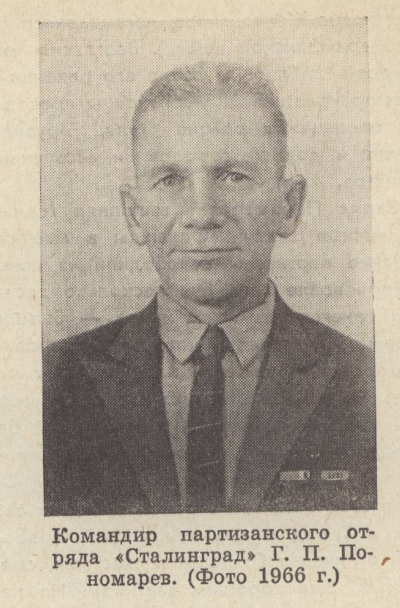
Let us dwell on this operation in more detail. On the outskirts of the village of Anemone there is a two-story log house - a German barracks. Behind it stands in an open field, surrounded by two rows of barbed wires, an air defense post - a hardware booth, on the roof of which sound absorbers are mounted. A little further observation tower with a machine gunner. In the hardware there are several operators on duty. The air defense post, the barracks and the nearest airfield are connected by telephone wires stretched on the poles.
At 2 in the morning of February 23, nine fighters of the partisan detachment crept forward to the post. With the help of forceps, we grabbed barbed wire and penetrated into the closed area. Ponomarev signaled, and Mikhail Malyshev, moving forward, threw a grenade through the window of the apparatus booth. There was a powerful explosion. With shouts, the surviving Germans jumped out of the building, but after seeing the partisans, they rushed back. Their attempt to reach the barracks by field telephone was in vain. Guerrillas prudently cut all the wires and "removed" on the watch tower. Without wasting time, M Sosnin threw another grenade into the booth. No survivors this time.
Having scattered tricolor leaflets on the territory with the inscription “ITP”, which was deciphered “International Terror of Partisans” (the partisans did this in order to prevent the threat of German reprisals against the French population), the fighters hid in the night.
Trying to confuse the tracks, George Polikarpovich led the detachment in the direction of the Belgian border not on the partisan base. After waiting a few days, when the fascists stopped searching and calmed down, the soldiers returned to the forest near Verdun again. Rumors about Ponomarev's detachment spread very quickly to the surrounding area. He became a real threat to the Germans. The detachment inflicted sudden, swift strikes on the fascists, caused him substantial damage and skillfully, without loss, left.
The Germans made every effort, trying to establish the location of the Soviet partisans. In the end, they still managed it. Then Georgy Polikarpovich decided to hastily transfer the detachment to another area. The fighters secretly left the lived-in base and set off on a difficult path. However, either the Gestapo were really professionals, or the French residents of the surrounding villages were quite satisfied with the occupational German regime, and the DeGoll appeal to fight for a free France did not touch their hearts at all, but the Gestapo agents could again attack the trail of the detachment. In one of the villages, about three hundred punishers piled on a handful of fighters. A fight started.
Ponomarev was forced to leave several people for cover, and the remnants of the detachment made a bold maneuver and managed to divert the partisans from the strike to Anu forest. For two weeks, the fighters sat there, unable to act. It was necessary to survive both multi-day hunger and cold. As a result, the Nazis considered that the detachment was destroyed. However, they were mistaken. Soon he was back to action. After moving to the Pann region, Soviet partisans 27 March 1944 of the year destroyed the mine in Piena, which worked in the interests of the Reich. The result of this operation was the fact that the local metallurgical plant, producing products for military plants in Germany, stopped receiving coal. Restoration of the mine took the Germans a lot of time and money.
In the spring, another group of Soviet people who escaped from the fascist camps joined the detachment: Vasily Polyakov, Sergey Larin, Victor Evplov, Anatoly Shchekin, Valentin Karpenko, Fyodor Gorovoy, Makariy Smyk, Nektor Sharukhnya, Nikolai Belichenko and others. Forces increased, and the blows at the enemy became stronger. Only from April to May in the areas of Kondrekur, Broussay, Fromesay, Spencourt, Charancy, Aransi, Pann, Baroncourt, Toul, Geneva, and others, did the partisans detonate 20 German troops with soldiers and military equipment (including airplanes), ammunition, fuel and other military materials.
G. Ponomarev, M. Sosnin, D. Ogorodnikov, M. Malyshev, F. Aksinin, S. Larin, P. Nosikov, V. Lavrentyev, V. Kuznetsov, N. Kozhin, A. especially distinguished themselves in the “war on the tracks”. Kuzmin, I.Rubtsov, Frenchman Rene. In June 1944, the partisan unit “Stalingrad” singled out a group of people in 12, from which a separate unit was created, called “Zheleznyak” (in honor of the sailor-partisan Zheleznyakov, the hero of the civil war). He was headed by Andrei Tsybikov, and after his injury, the command took Viktor Ignatiev. Zheleznyakovtsy conducted operations in the area of Tula, Eruville, Pien and other cities and towns.
Ponomarev's detachment performed a variety of tasks. Once in May, Soviet partisans liberated several dozen Algerians and Senegalese, former French soldiers prepared by the Germans to be sent to Germany for hard labor, from a concentration camp near the village of Buk. They formed an international partisan battalion led by Hayk Ter-Tebiryan, who took the nickname “Ardi”. He led his battalion to the area of the neighboring villages of Buk and Trond and began to act there. Ike was distinguished by great courage, courage, was a good tactician. However, it was not given to him to fight for a long time. In the summer of 1944, up to one and a half hundreds of punishers, they suddenly surrounded these villages, seized Ter-Tebiryan and other partisans, and executed them.
When 6 June 1944, the Allied forces landed in Normandy and the French people rose to armed insurrection, the Ponomarev detachment intensified strikes against the fascists, and first of all on German communications.
A very bold operation was carried out by the Stalingrad detachment at the large railway hub Meray, in the Upper Marne department. For two days Ponomarev carefully studied the object of the attack. And at dawn 8 August the whole squad came here. The commander hid him in a small forest, stretching along the railroad tracks on the east side of the station. Well disguised in the forest, the partisans were tensely awaiting the start of the operation. In the evening, Ponomarev broke up the squad into three groups and set specific tasks for them. The first group in 22 of a man headed by Sosnin was to take a position next to the water tower, opposite the barracks. If the soldiers, raised in alarm, rush to the station and the depot, the partisans will have to meet them with massive fire. The second group of 10 people under the command of Malyshev had to occupy the station building, break the connection and block all station entrances and exits. The third group, the demolition men, was headed by Ponomarev himself. The main task was assigned to it - to disable the locomotive park of the station.
Exactly at ten o'clock in the evening, the first group crossed the railroad tracks and lay down at the water tower, ready at the right moment to provide fire support. Five minutes later, the second group broke into the station building and, without firing a single shot, captured him, and the third rushed to the locomotive depot.
Approaching him, Ponomarev saw two locomotives standing under steam. Former railwayman, he quickly realized what to do. Nearby sat a group of workers. George understood: they are machinists. He approached them and said in French that the help of machinists was required. “And who are you?” Asked one of the workers. “We are Soviet partisans,” answered Ponomarev and asked who the engine was at the extreme. One of the French said that he was assigned to this machine and expressed readiness to help the Soviet fighters. "Then quickly on the engine, turn up the pressure, let's go full speed and jump!" - the commander of the partisans gave the task. The driver readily agreed. With a sharp movement of leverage, he let out a full steam. The engine jerked and rolled forward. Having driven about twenty meters, Ponomarev jumped off, followed by a Frenchman. The engine at high speed flew up to the arrow, spread it and, turning at an angle of 90 °, crashed into the sleepers. The driver of the second locomotive launched the locomotive to the first. A powerful explosion of two locomotive boilers shook the neighborhood.
Ponomarev rushed to the third locomotive. Rising into the booth, he instructed the driver to bring the locomotive for the passing arrow, and then at a speed to send it to the train with fuel. At high speed locomotive crashed into a tank with aviation gas. There was another deafening explosion. The tank drowned in bright flames and clouds of smoke. Then lit up the second, third. Flamed the entire composition. The fire spread to other ways, where there were cars with ammunition and equipment.
Without losing precious time, the partisans blew up the turntable and rendered depot machining equipment in disrepair. The main task was completed. But it was still too early to leave. A group of Sosnin started a battle with German soldiers who jumped out of the barracks. Ponomarev and his group hurried to her rescue. After completing the operation, the partisans quickly moved away towards the forest. Frightened by a commotion at the station, in the morning the fascist command pulled hundreds of soldiers and officers to Meray station and drove up artillery. For nearly an hour and a half, they fired at an empty forest, and then began to comb it. But at that time the partisans had already left.
Not a single operation was carried out by the Stalingrad detachment. By order of the military-political headquarters of the Soviet partisan detachments, the Ponomarev troops cut the way for the German units, which, under pressure from the French internal forces and allied forces, retreated to the borders of Germany, blew up power lines, disrupting the supply of military-industrial facilities with electricity, ambushed, captured soldiers and officers, incapacitated enemy military equipment.
In early September, Ponomarevs attacked the railway station in Shumbley and blew up the water tower, holding down the movement of railway transport. In the village of Tinekur, Soviet soldiers defeated an enemy convoy, captured several soldiers with weapons.
For a relatively short period - February - September 1944 of the year - the guerrilla unit "Stalingrad" conducted 72 combat operations, including destroyed 25 trains with military equipment and materials, fuel and manpower of the enemy, disabled 30 locomotives and more 320 different cars .
For courage, courage, shown in the battles with the Nazis, the French awarded George Ponomarev with the Order "Military Cross with a Bronze Star." The order on awarding 23 No. 3 in March 1945 of the year, signed by the commander of the military district Colonel Granval, emphasized: “Selfless to fanaticism, a man of amazing courage, Ponomarev inflicted huge losses on the enemy, captured many soldiers and officers captive and thereby made a significant contribution to the liberation of France. "
And in the certification (an extract from the order on “Fighting France”), issued and signed by “Laurent” and “Marcel”, then representing the 21 inter-district Military Committee of the FTP, said that for the courageous and competent leadership of the Stalingrad squad in the battles, Frantirer Lieutenant G. Ponomarev earned the gratitude of the French nation. The French awards were also received by other partisans from the Stalingrad unit. So the Soviet people, being thousands of kilometers away from their native country, helped our army and brought the Victory over Nazi Germany closer.
In conclusion, I would like to note that the Stalingrad detachment was not the only one in France. According to French data, around 60 detachments formed by Soviet citizens who had escaped from fascist concentration camps acted on their territory. And in Europe as a whole, Soviet and international units fought over the 30000 of our compatriots, who managed to escape from the German prison.
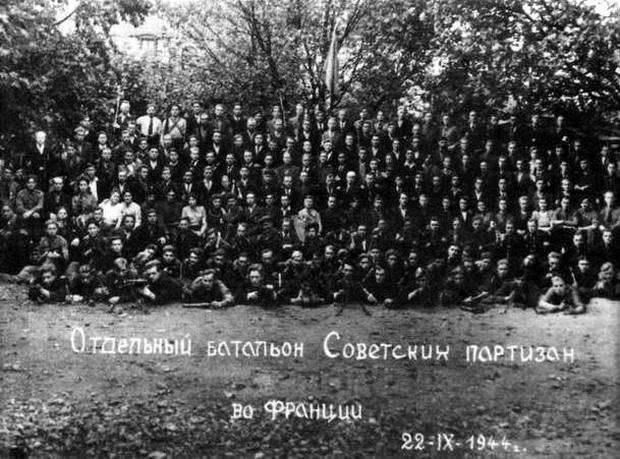
Sources:
L. Bychkov. Partisan movement during World War II in 1941 — 1945. M .: Thought, 1965. C. 392-395.
Panov V. French "Stalingrad" // Century. 15 May 2012.
G. Nechaev. Two of the Stalingrad Detachment // Ulyanovskaya Pravda. 10 May 2012.
Nechaev G. In the forests of Lorraine // Militaryhistorical magazine. 1974. No. 1. S. 86-89.
Kokorin M., Struchkov A. On the combat activities of Soviet patriots in France in 1943-1944 // Questions of history. 1960. No. 3. S. 97-101.
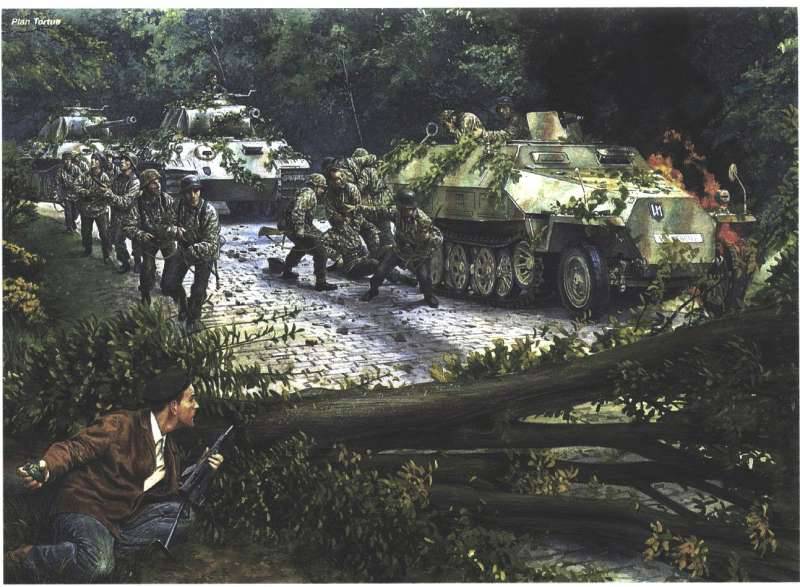
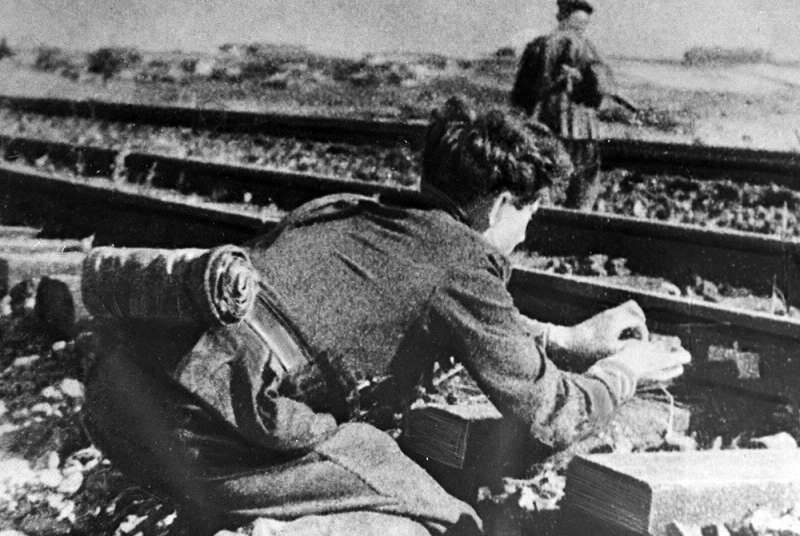
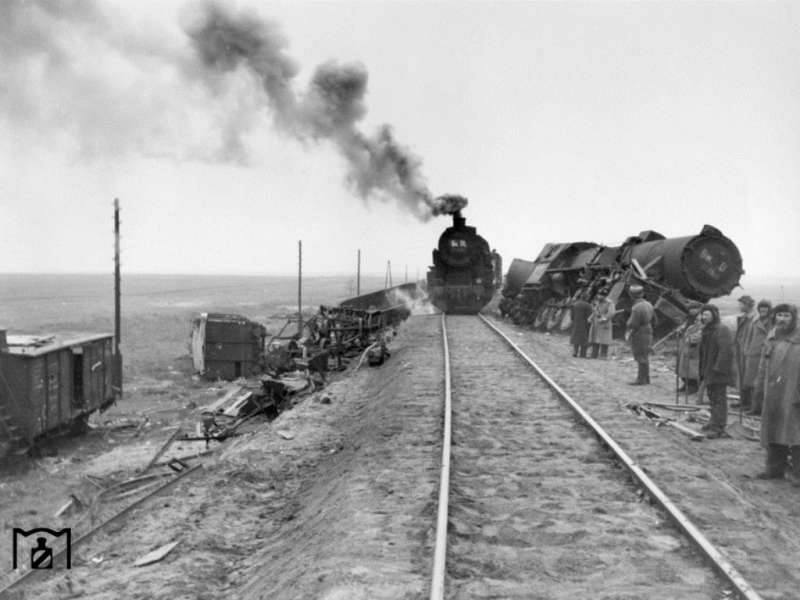
Information